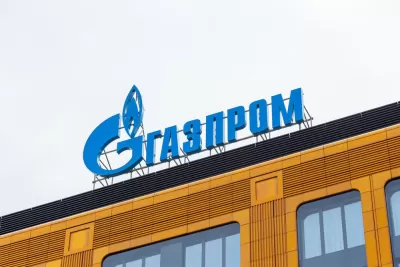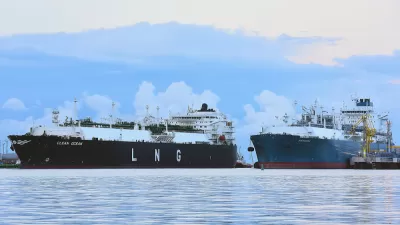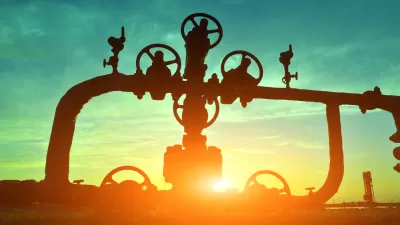When President Putin ordered Gazprom to turn off the valve on pipelines carrying Russian gas to Poland and Bulgaria, he effectively expanded the Russia-Ukraine war to the European Union, threatening their economic well-being and way of life.

Ursula von der Leyen, the president of the European Commission, hit back hard at Russian President Vladimir Putin's cutoff of natural gas to two of the E.U.'s 27 member nations on April 27.
“Gazprom's announcement that it is unilaterally stopping gas deliveries to certain E.U. member states is another provocation from the Kremlin” she stated in Brussels on Wednesday (1:24 minute AP video via The New York Times).
“It comes as no surprise that the Kremlin uses fossil fuels to try to blackmail** us… Our response will be immediate, united and coordinated.
“Both Poland and Bulgaria are now receiving gas from their EU neighbours,” she said. “The era of Russian fossil fuels in Europe will come to an end.”
Russian President Vladimir Putin has attempted to turn up the pressure by insisting that Russia will only accept payments for gas in roubles – hoping to force his foes to prop up his currency," writes EURACTIV's Frédéric Simon on April 27.
But von der Leyen said that “about 97%” of all EU contracts explicitly stipulate payments in euros or dollars and warned importing firms off paying in roubles.
“This would be a breach of the sanctions,” she told reporters.
EU provides 'workaround'
While von der Leyon made a forceful presentation on standing up to Putin, her members don't want to have their gas delivery halted like Poland and Bulgaria, so the commission has essentially devised a 'workaround' for the sanctions, described by Matina Stevis-Gridneff, Brussels bureau chief for The New York Times, on April 27 in the source article for this post.
The guidance suggested countries could set up new bank accounts with Gazprombank, a privately held arm of Gazprom which has been deliberately left off E.U. sanction lists. The countries could then pay into those accounts in euros, on the understanding that the bank would then convert them to rubles and pay Gazprom’s export company in that currency. On paper, that mechanism would keep the E.U. countries or companies at arm’s length from the conversion.
Germany plans for rationing
The Associated Press reported on April 28 that most countries will be using this scheme.
“Europe (and) Germany will make payments in euros and others may pay in dollars, and not in rubles,” Germany’s Economy Minister Robert Habeck said Wednesday (April 27).
"The conversion, once the payments have been made, is a matter for Gazprom. We have discussed this with the European Union. We will continue down this path.”
A cutoff of Russian gas would likely have the most profound impact on Germany, Europe's large economy. Stevis-Gridneff observed in an earlier post that it “is the key country holding the bloc back from an outright ban on oil and gas, though the idea is also unpopular in other, smaller European nations that largely rely on Russian supplies.”
Planning has begun to prepare for the cutoff possibility, including gas rationing.
At the outset of the war, Germany relied on Russia to meet 55 percent of its natural gas needs," writes Berlin-based Melissa Eddy for The New York Times on April 28.
Since Moscow’s invasion of Ukraine on Feb. 24, the country has reduced that amount to 35 percent by canceling some contracts and importing more liquefied natural gas, or L.N.G., from other countries.
Earlier this year, the government began a review process that could, if necessary, mandate gas rationing. But if Russia were to stop gas flows to Germany, the economy ministry reported to Parliament recently, the situation could become critical quickly.
Russian oil embargo coming
Earlier in April, Germany agreed to an EU ban on Russian coal which would take four months to fully enact. Oil would be next, adds Eddy.
[Germany] will soon be in position to do the same with oil, Mr. Habeck [the economy minister] said this week, after a trip to Poland that he said was part of the government strategy “to step by step, set the conditions and to meet them” to achieve independence from Russia.
“And now we will do the same thing with gas,” Mr. Habeck said.
The next day, Germany agreed "to a gradual, EU-wide embargo” of Russian oil, reports Quartz correspondent, Samanth Subramanian, on April 29.
**Footnote on 'blackmail': Steve Inskeep, host on NPR's Morning Edition, asked energy expert, Daniel Yergin on April 28, "We heard the Russia move called a warning shot. Europeans have also called it blackmail. How would you describe it?”
Well, I think it is a major sign that Putin just a couple of weeks ago said that Europe can't do without energy," Yergin, author of The Prize, The Quest, and most recently, The New Map: Energy, Climate, and the Clash of Nations, responded. “I think he's demonstrating with this that he will use energy as a weapon or try to use it.”
For the transcript and 7-minute audio, see “Experts expect Putin will try to weaponize its energy resource.”
FULL STORY: E.U. countries scramble to find a way to pay Russia for gas without violating sanctions.

Planetizen Federal Action Tracker
A weekly monitor of how Trump’s orders and actions are impacting planners and planning in America.

Map: Where Senate Republicans Want to Sell Your Public Lands
For public land advocates, the Senate Republicans’ proposal to sell millions of acres of public land in the West is “the biggest fight of their careers.”

Restaurant Patios Were a Pandemic Win — Why Were They so Hard to Keep?
Social distancing requirements and changes in travel patterns prompted cities to pilot new uses for street and sidewalk space. Then it got complicated.

Platform Pilsner: Vancouver Transit Agency Releases... a Beer?
TransLink will receive a portion of every sale of the four-pack.

Toronto Weighs Cheaper Transit, Parking Hikes for Major Events
Special event rates would take effect during large festivals, sports games and concerts to ‘discourage driving, manage congestion and free up space for transit.”

Berlin to Consider Car-Free Zone Larger Than Manhattan
The area bound by the 22-mile Ringbahn would still allow 12 uses of a private automobile per year per person, and several other exemptions.
Urban Design for Planners 1: Software Tools
This six-course series explores essential urban design concepts using open source software and equips planners with the tools they need to participate fully in the urban design process.
Planning for Universal Design
Learn the tools for implementing Universal Design in planning regulations.
Heyer Gruel & Associates PA
JM Goldson LLC
Custer County Colorado
City of Camden Redevelopment Agency
City of Astoria
Transportation Research & Education Center (TREC) at Portland State University
Camden Redevelopment Agency
City of Claremont
Municipality of Princeton (NJ)





























